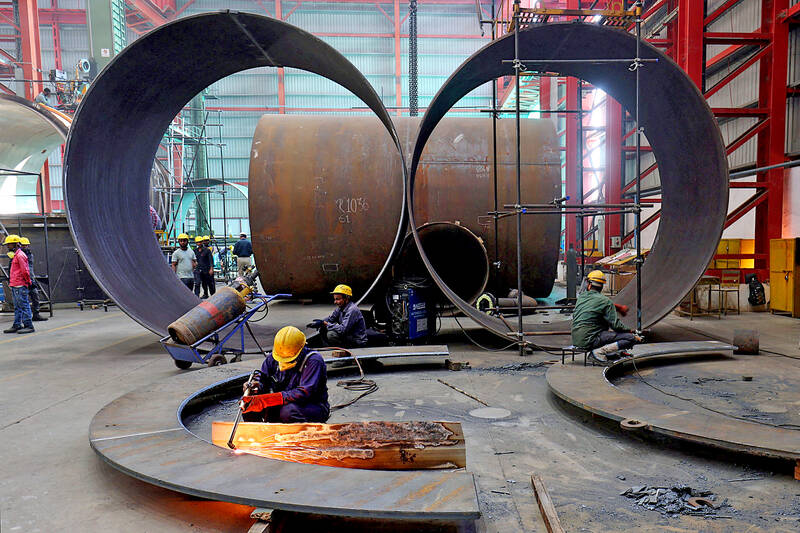Factories across Asia expanded at a lackluster pace last month as demand cooled, ahead of a trade war that US President Donald Trump launched on the weekend.
The purchasing managers’ index gauge for manufacturing-heavy countries showed tepid activity, according to the S&P Global.
In Vietnam, the index contracted further to 48.9 as output fell for the first time in four months, and in South Korea, activity improved slightly to 50.3, just above the 50-mark indicating expansion.

Photo: Reuters
Across Southeast Asia, activity fell to an 11-month low of 50.4. Five major economies including Japan showed a deterioration overall while South Korea, Indonesia and Malaysia showed slight improvement.
Manufacturing growth eased in China to the weakest in four months and below economists’ expectations.
The biggest drags on activity across many countries were output and new orders. In a sign of weakening demand from abroad, export orders fell for the third month in a row in Vietnam, demand eased in Taiwan and contracted for an eighth month in Japan. Export orders rose slightly in South Korea.
Purchases of inputs slowed to a three-month low and confidence remained subdued across Southeast Asia, S&P said.
“New orders and output both expanded at a softer pace, and the export market continued to hold back overall sales growth,” S&P Global Market Intelligence economist Maryam Baluch said in a statement yesterday.
The latest figures show the state of trade across the region before Trump announced tariffs over the weekend on the US’ three largest trading partners China, Mexico and Canada. The levies are set to upend trade globally, though could also shift demand for production to many countries across Asia as firms seek to avoid tariffs.
Trump also said that levies are coming soon for the EU, signaling an expansion of the trade battle.
The region faces mounting challenges in the year ahead. Slowing economic growth in China, Europe and the US has reduced demand for exports, including chips and technological goods that Taiwan and South Korea specialize in making.
Protectionism globally is also a growing risk. While Trump has avoided issuing tariffs or threats of levies against most countries in the region — with China being a major exception — his administration has made trade deficits a major focus. The impact of levies on China are also set to dent activity in the world’s second-largest economy, with spillovers across the region.

Hon Hai Precision Industry Co (鴻海精密) yesterday said that its research institute has launched its first advanced artificial intelligence (AI) large language model (LLM) using traditional Chinese, with technology assistance from Nvidia Corp. Hon Hai, also known as Foxconn Technology Group (富士康科技集團), said the LLM, FoxBrain, is expected to improve its data analysis capabilities for smart manufacturing, and electric vehicle and smart city development. An LLM is a type of AI trained on vast amounts of text data and uses deep learning techniques, particularly neural networks, to process and generate language. They are essential for building and improving AI-powered servers. Nvidia provided assistance

DOMESTIC SUPPLY: The probe comes as Donald Trump has called for the repeal of the US$52.7 billion CHIPS and Science Act, which the US Congress passed in 2022 The Office of the US Trade Representative is to hold a hearing tomorrow into older Chinese-made “legacy” semiconductors that could heap more US tariffs on chips from China that power everyday goods from cars to washing machines to telecoms equipment. The probe, which began during former US president Joe Biden’s tenure in December last year, aims to protect US and other semiconductor producers from China’s massive state-driven buildup of domestic chip supply. A 50 percent US tariff on Chinese semiconductors began on Jan. 1. Legacy chips use older manufacturing processes introduced more than a decade ago and are often far simpler than

STILL HOPEFUL: Delayed payment of NT$5.35 billion from an Indian server client sent its earnings plunging last year, but the firm expects a gradual pickup ahead Asustek Computer Inc (華碩), the world’s No. 5 PC vendor, yesterday reported an 87 percent slump in net profit for last year, dragged by a massive overdue payment from an Indian cloud service provider. The Indian customer has delayed payment totaling NT$5.35 billion (US$162.7 million), Asustek chief financial officer Nick Wu (吳長榮) told an online earnings conference. Asustek shipped servers to India between April and June last year. The customer told Asustek that it is launching multiple fundraising projects and expected to repay the debt in the short term, Wu said. The Indian customer accounted for less than 10 percent to Asustek’s

Gasoline and diesel prices this week are to decrease NT$0.5 and NT$1 per liter respectively as international crude prices continued to fall last week, CPC Corp, Taiwan (CPC, 台灣中油) and Formosa Petrochemical Corp (台塑石化) said yesterday. Effective today, gasoline prices at CPC and Formosa stations are to decrease to NT$29.2, NT$30.7 and NT$32.7 per liter for 92, 95 and 98-octane unleaded gasoline respectively, while premium diesel is to cost NT$27.9 per liter at CPC stations and NT$27.7 at Formosa pumps, the companies said in separate statements. Global crude oil prices dropped last week after the eight OPEC+ members said they would